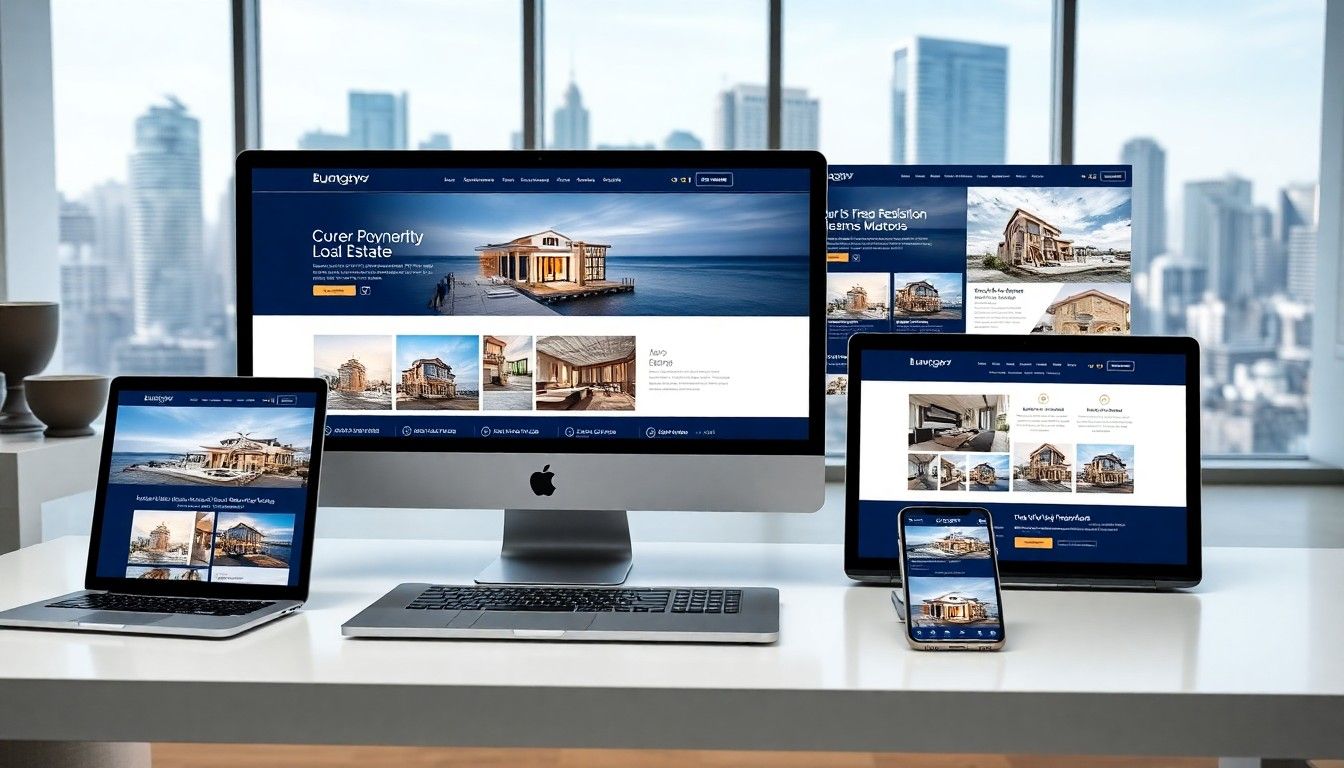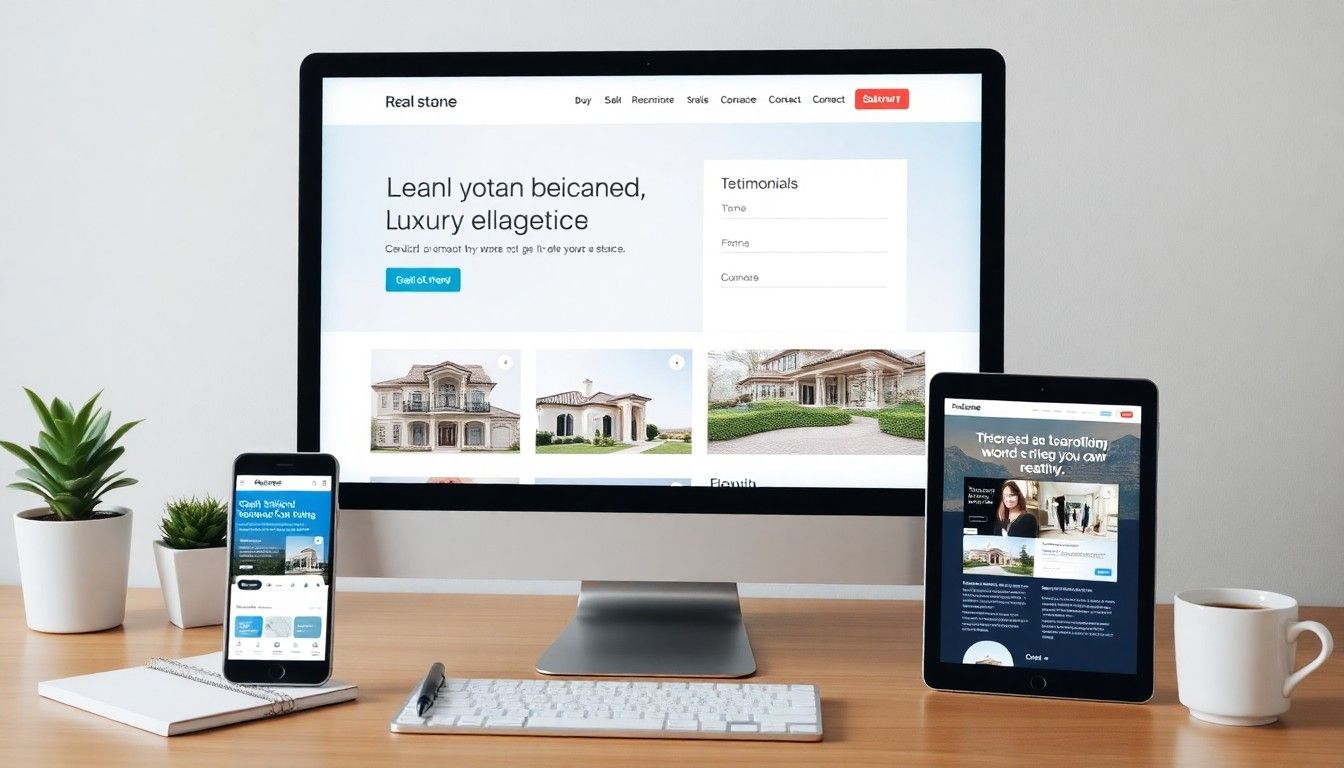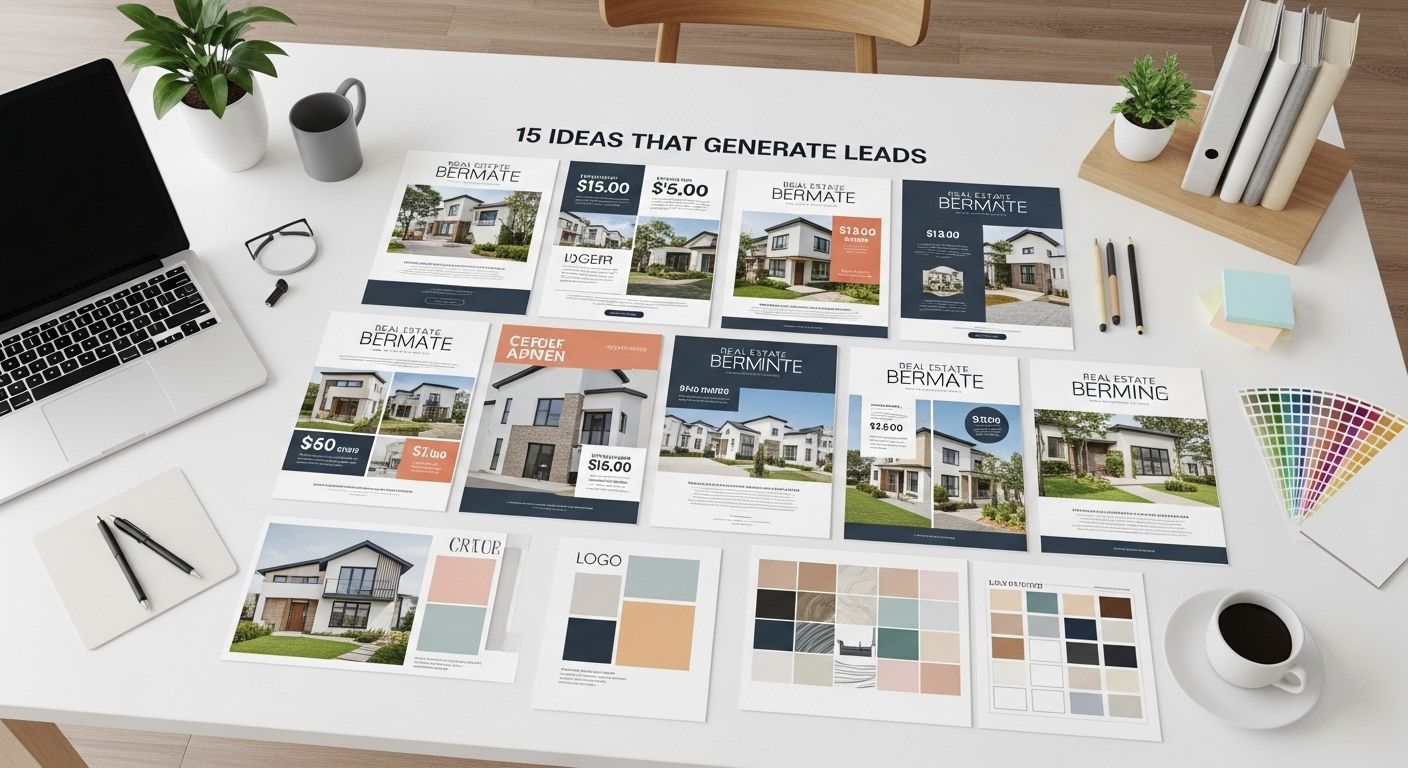Real Estate Marketing Trends 2025: What’s Shaping the Industry Right Now
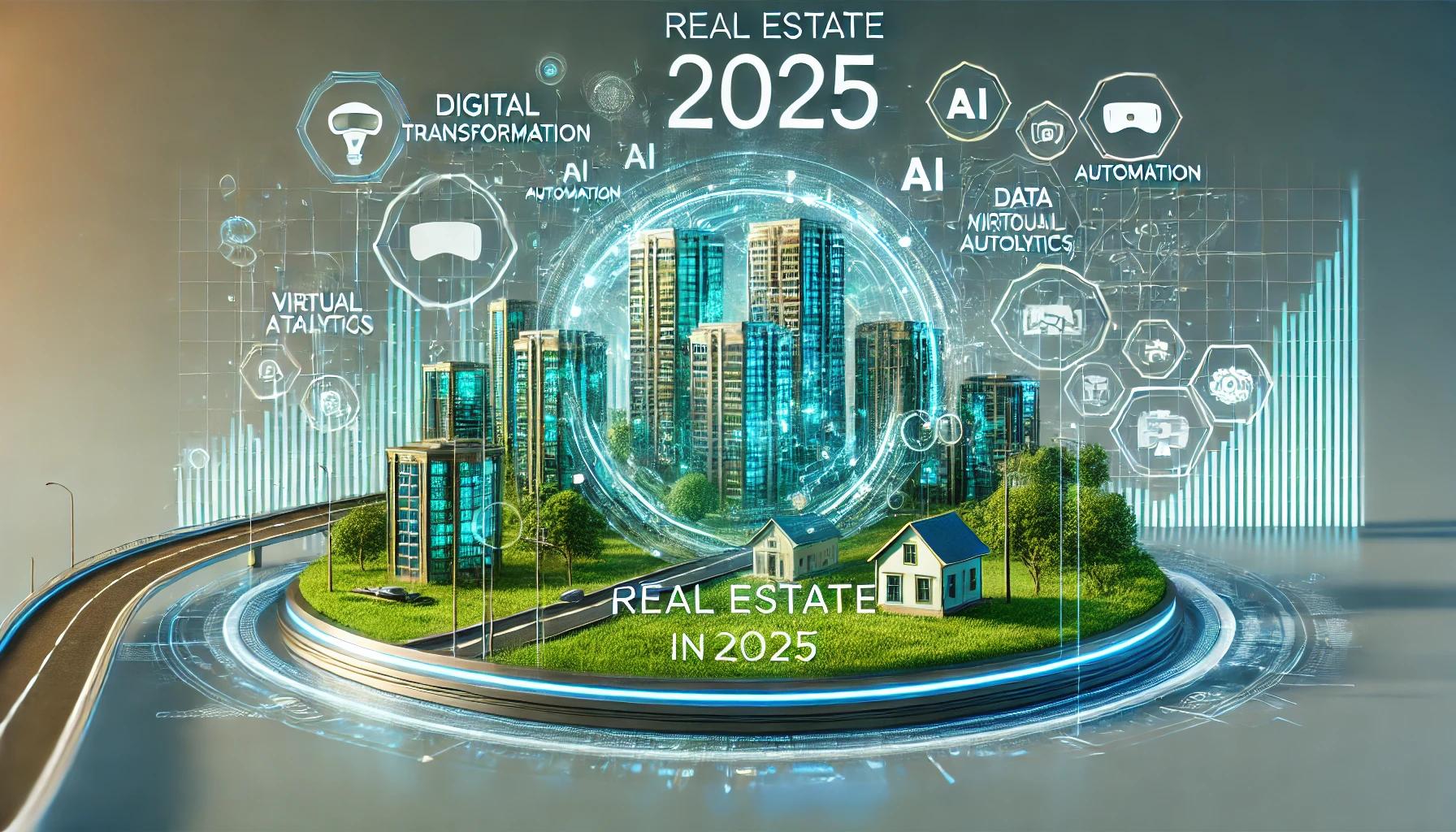
he convergence of digital transformation and sustainability is creating unprecedented opportunities in real estate marketing for 2025. Real estate professionals are witnessing a fundamental shift where artificial intelligence, virtual experiences, and eco-conscious practices are no longer optional extras but essential components of successful marketing strategies.
The most significant real estate marketing trends for 2025 center around digital transformation, with AI-driven automation, virtual tours, and sustainable property promotion leading the way. These changes are reshaping how properties are marketed, sold, and managed, creating new opportunities for those ready to adapt.
As a web design and development agency specializing in real estate digital solutions, we've observed firsthand how these trends are transforming the industry. Let's dive into what's driving these changes and how you can leverage them effectively.
Digital Transformation in Real Estate Marketing
AI and Automation Revolution
Artificial intelligence is revolutionizing real estate marketing through sophisticated automation and data analysis capabilities. According to Deloitte's commercial real estate outlook, AI integration in marketing strategies has become a critical differentiator for successful real estate businesses.
The adoption of AI tools ranges from chatbots for customer service to sophisticated content creation and data analysis systems, fundamentally changing how properties are marketed and sold.
Here's what we're seeing in terms of AI implementation:
- Automated lead qualification and nurturing systems
- Predictive analytics for property valuation
- Smart chatbots handling initial client inquiries
- AI-powered content generation for property descriptions
- Automated social media marketing campaigns
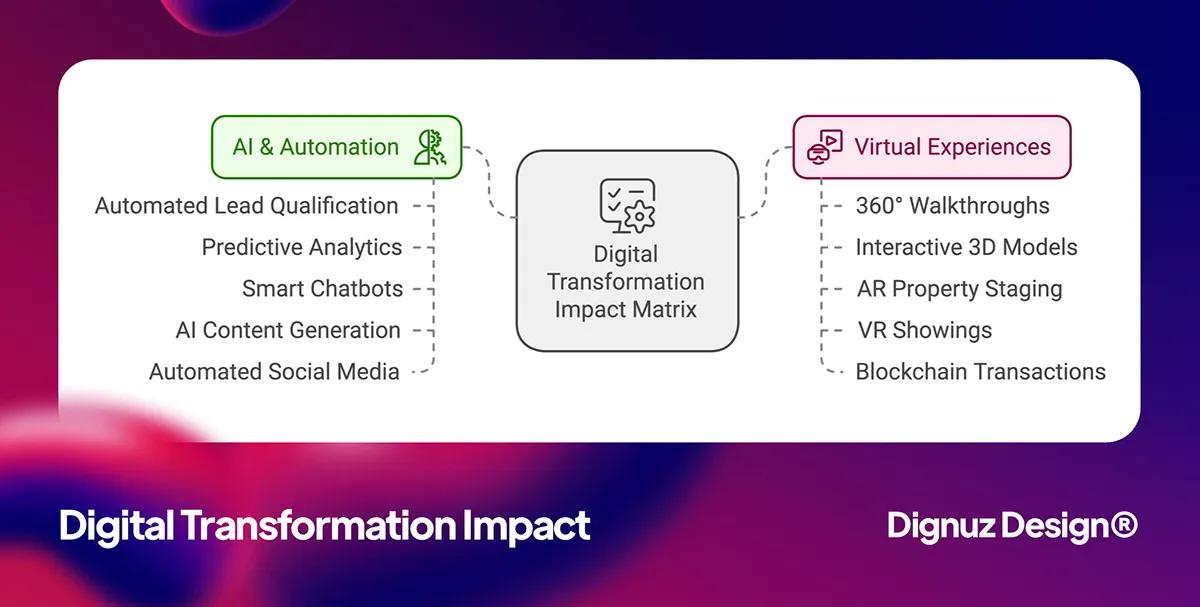
Virtual Tours and Digital Transactions
The digital transformation of property showcasing has reached new heights. According to recent studies on 3D visualization, there's a significant increase in demand for transparency and accuracy in real estate project presentations, particularly in North America and Europe.
Virtual tours have evolved from simple photo galleries to immersive experiences that include:
- 360-degree property walkthroughs
- Interactive 3D models
- Augmented reality property staging
- Virtual reality showings
At Dignuz Design, we've seen firsthand how 3D visualization technologies are transforming property presentations. These tools aren't just about showing properties—they're about creating engaging experiences that convert viewers into serious buyers.
The integration of blockchain technology is also revolutionizing transaction processes, making them more secure and efficient. This shift towards digital transactions represents a fundamental change in how real estate deals are conducted, offering greater transparency and reduced processing times.
Sustainability: The New Marketing Cornerstone
Sustainability has evolved from a nice-to-have feature to a crucial selling point in real estate marketing. According to PwC's Emerging Trends in Real Estate 2025, properties with green certifications are commanding premium prices and attracting more interested buyers than ever before.
Green Building Marketing Strategies
The key to successful green building marketing lies in effectively communicating both environmental benefits and practical advantages to potential buyers. Smart home features and energy efficiency aren't just eco-friendly choices—they're significant cost-saving investments that appeal to modern buyers.
Standard HVAC:
- Sustainable Alternative: Smart Climate Control
- Marketing Angle: 30-40% Energy Savings
Regular Windows
- Sustainable Alternative: Energy-Efficient Glass
- Marketing Angle: Improved Comfort + Lower Bills
Standard Materials
- Sustainable Alternative: Eco-Friendly Materials
- Marketing Angle: Health Benefits + Sustainability
When marketing green properties, focus on these key aspects:
- Energy efficiency ratings and certifications
- Smart home automation capabilities
- Sustainable material choices and their benefits
- Long-term cost savings for buyers
Urban Development Marketing
The trend toward sustainable urban planning has created new opportunities in real estate marketing. Mixed-use developments that promote walkability and access to public transit are becoming increasingly attractive to eco-conscious buyers. As highlighted in our guide to luxury real estate marketing, sustainable urban developments often command premium prices due to their lifestyle benefits.
Key marketing points for sustainable urban developments include:
Modern buyers are increasingly prioritizing developments that offer a perfect blend of sustainability, convenience, and community connection.
Successful marketing strategies for these developments emphasize:
- Walkability scores and proximity to amenities
- Public transportation access
- Community green spaces and shared facilities
- Reduced carbon footprint through smart design
To effectively market sustainable properties, it's crucial to create compelling visual content that showcases these features. Through our AmplyViewer platform, we've seen how interactive 3D tours can effectively highlight sustainable features and their benefits to potential buyers.
Marketing ROI of Sustainable Features
The return on investment for sustainable features extends beyond environmental benefits. Properties with green certifications often see:
- Higher resale values
- Reduced time on market
- Increased buyer interest
- Better long-term maintenance costs
When marketing sustainable properties, it's essential to focus on both immediate and long-term benefits. Create content that educates buyers about the practical advantages of sustainable features while emphasizing the positive environmental impact.
Personalization and Location-Based Marketing
The era of one-size-fits-all real estate marketing is over. According to PwC's European real estate analysis, successful real estate marketing in 2025 hinges on delivering highly personalized experiences that align with specific buyer demographics and locations.
Targeted Marketing Strategies
Location-based marketing has evolved beyond simple geographic targeting. Today's sophisticated approaches combine multiple data points to create highly targeted campaigns that resonate with specific audience segments.
The modern targeting process follows this progression:
- Demographic Data Collection
- Age groups and family status
- Income levels and profession
- Lifestyle preferences and habits
- Location Intelligence
- Neighborhood preferences
- Commuting patterns
- Local amenity usage
- Behavioral Analysis
- Property viewing patterns
- Online search behaviors
- Engagement with marketing materials
As we've demonstrated in our guide to creating eye-catching digital ads, personalized content significantly improves engagement rates and lead quality.
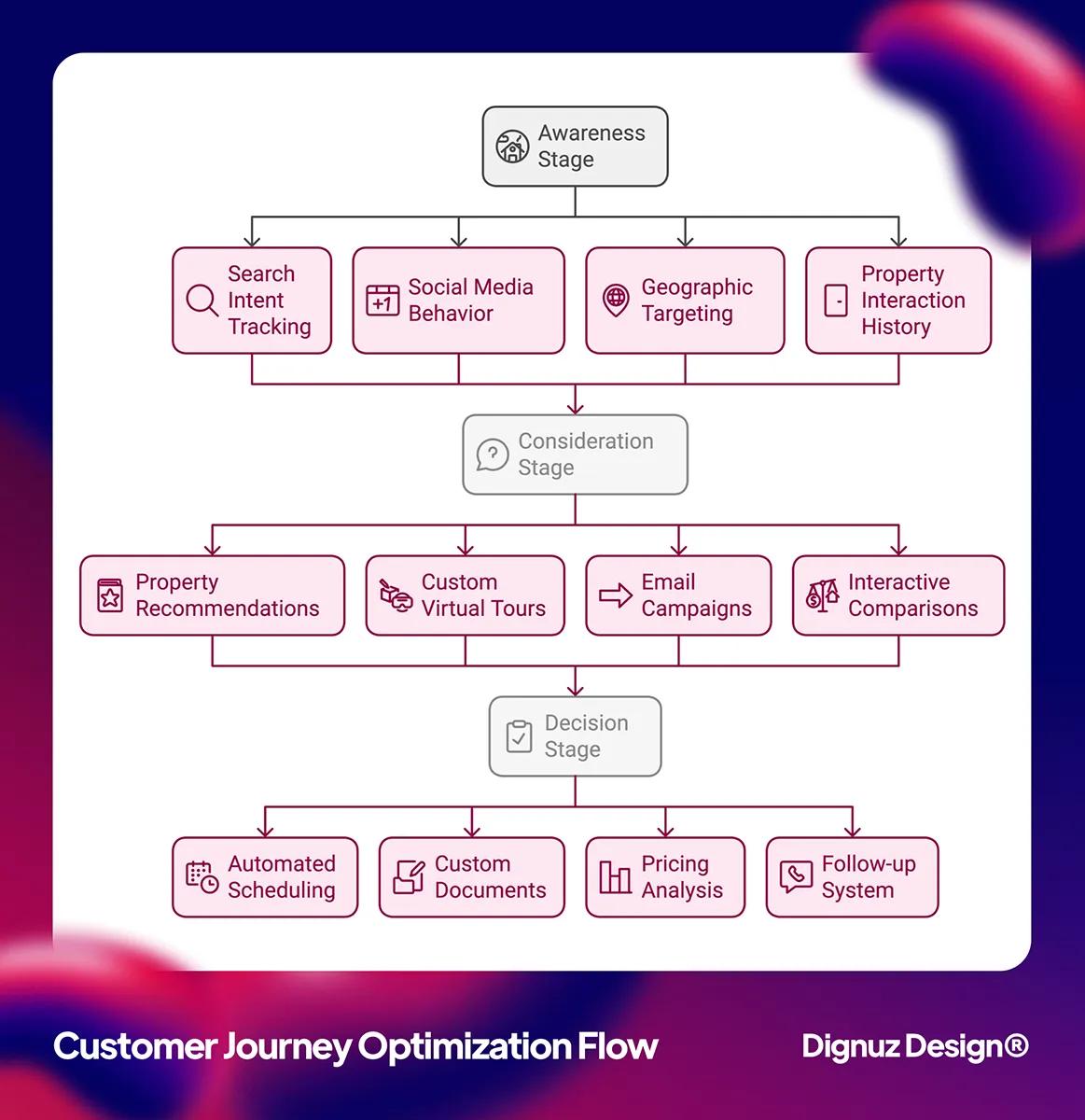
Customer Journey Optimization
The modern real estate customer journey is increasingly digital and requires careful optimization at each touchpoint. Here's how to enhance each stage:
Successful customer journey optimization requires a perfect balance between automated efficiency and personal touch points that build trust and engagement.
Awareness Stage
Implement targeted content delivery based on:
- Search intent patterns
- Social media behavior
- Geographic location
- Previous property interactions
Consideration Stage
Enhance engagement through:
- Personalized property recommendations
- Custom virtual tours
- Targeted email campaigns
- Interactive property comparisons
Decision Stage
Support conversion with:
- Automated scheduling systems
- Personalized property documents
- Custom pricing analyses
- Targeted follow-up communications
To effectively implement these strategies, consider using:
CRM Systems:
- Purpose: Lead Management
- Key Benefit: Automated Follow-ups
Marketing Automation
- Purpose: Content Delivery
- Key Benefit: Personalized Messaging
Analytics Platforms
- Purpose: Behavior Tracking
- Key Benefit: Data-Driven Decisions
Integration of these tools with your existing marketing stack is crucial. Our experience shows that properties marketed through personalized, location-aware campaigns typically generate significantly more qualified leads than those using traditional methods.
Content and Social Media Evolution
The landscape of real estate social media and content marketing is undergoing a dramatic transformation in 2025. According to recent analysis of 3D design trends, innovative visual content is becoming the cornerstone of successful real estate marketing campaigns.
Platform-Specific Strategies
Each social media platform requires a unique approach to maximize engagement and reach. Let's explore the most effective strategies for each major platform:
Success in real estate social media marketing isn't about being everywhere—it's about being exceptional on the platforms where your target audience spends their time.
As outlined in our guide to social media rules for realtors, platform-specific content optimization is crucial for success.
Instagram:
- Content Type: Visual Stories & Reels
- Best Practices: Property Walkthroughs, Design Tips
Facebook:
- Content Type: Mixed Media & Live Events
- Best Practices: Virtual Open Houses, Market Updates
LinkedIn:
- Content Type: Professional Content
- Best Practices: Market Analysis, Investment Insights
YouTube
- Content Type: Long-form Video
- Best Practices: Property Tours, Area Guides
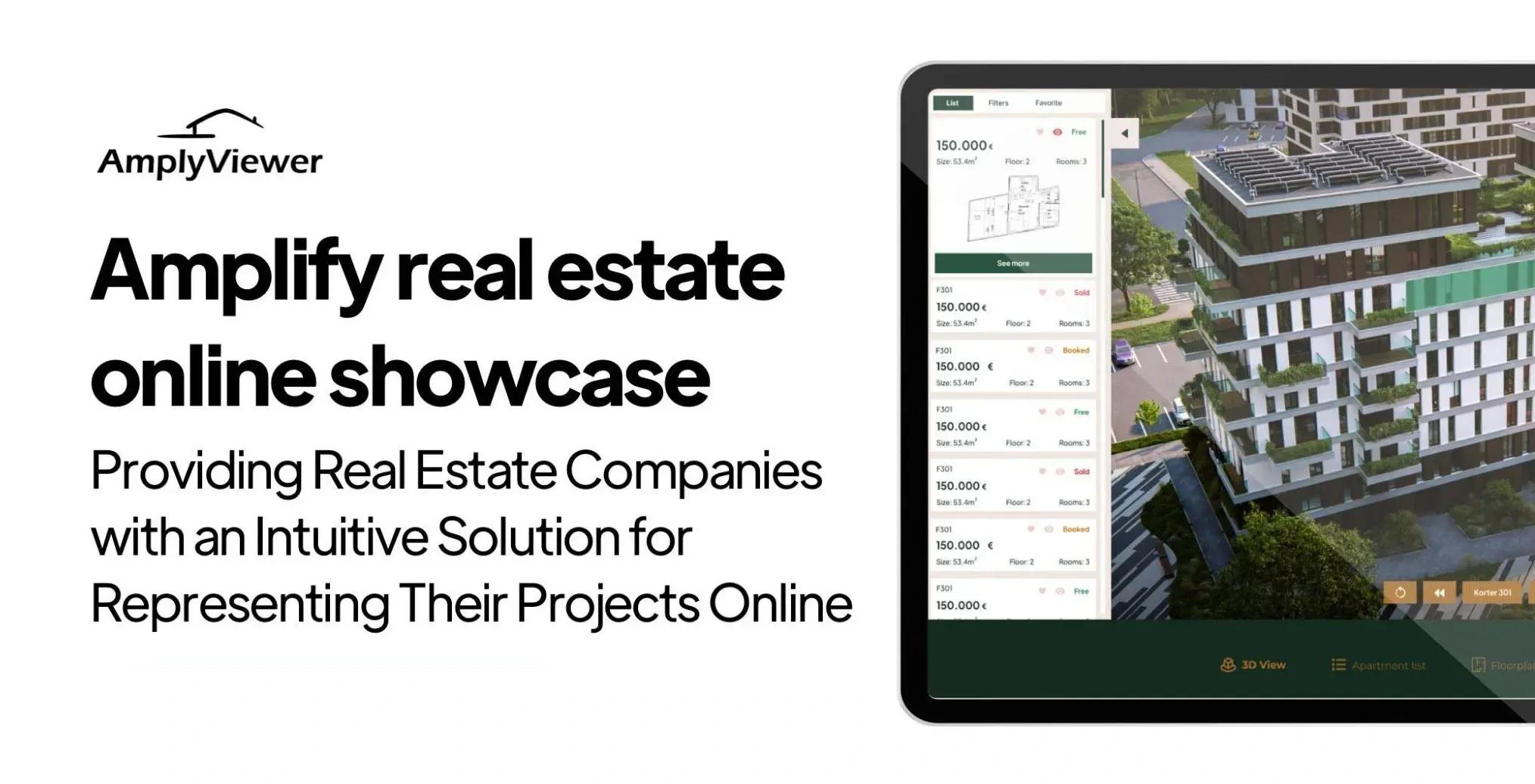
💻 Let us help you create a stunning online showcase for your projects that works seamlessly across all devices. Ready to amplify your real estate business? 👉 Explore AmplyViewer now
Visual Content Innovation
The evolution of visual content in real estate marketing has been revolutionary. Modern buyers expect immersive, interactive experiences that go beyond traditional photography.
Key Visual Content Trends
- Interactive 3D Tours
- Virtual walkthroughs
- Customizable viewing angles
- Measurement tools
- Augmented Reality Features
- Furniture placement
- Renovation visualization
- Color scheme testing
- Professional Videography
- Drone footage
- Lifestyle videos
- Neighborhood tours
To maximize the impact of your visual content:
- Invest in Quality Equipment
- High-resolution cameras
- Stabilization gear
- Lighting equipment
- Develop a Consistent Style
- Brand color schemes
- Signature editing style
- Recognizable formats
- Create Multi-Purpose Content
- Adaptable for different platforms
- Various aspect ratios
- Multiple length versions
Content Distribution Strategy
A well-planned content distribution strategy ensures your visual content reaches the right audience at the right time.
Consider this framework:
- Primary Distribution
- Website integration
- Social media platforms
- Email marketing campaigns
- Secondary Distribution
- Real estate portals
- Partner networks
- Industry publications
- Engagement Optimization
- Posting schedules
- Platform algorithms
- Audience behavior patterns
For optimal results, integrate your visual content with professional presentation tools that maintain quality and engagement across all platforms.
Measuring Content Performance
Track these key metrics to evaluate your content strategy:
- Engagement rates across platforms
- Time spent viewing property content
- Lead generation from different content types
- Conversion rates by platform
- ROI on visual content investment
Future-Proofing Your Real Estate Marketing
As we've seen from Savills' global real estate investment analysis, staying ahead in real estate marketing requires a strategic approach to technology adoption and skill development. Let's explore how to future-proof your marketing strategy.
Strategic Implementation Framework
Success in future real estate marketing isn't just about adopting new technologies—it's about creating a flexible, scalable foundation that can adapt to changing market demands.
Follow this comprehensive framework to build a future-ready marketing strategy:
Digital Infrastructure
- Implementation Steps: Upgrade core systems and tools
- Expected Outcome: Enhanced operational efficiency
Team Development
- Implementation Steps: Regular training and skill updates
- Expected Outcome: Improved capability and innovation
Content Creation
- Implementation Steps: Invest in visual content tools
- Expected Outcome: Better engagement and conversion
Data Analytics
- Implementation Steps: Implement tracking systems
- Expected Outcome: Data-driven decision making
Essential Investments for 2025
Based on our experience at Dignuz Design, these are the critical areas requiring investment:
- Technology Stack
- 3D visualization tools
- Marketing automation platforms
- CRM systems
- Analytics tools
- Content Creation Resources
- Professional photography equipment
- Video production capabilities
- Virtual tour technology
- AR/VR development
- Team Development
- Digital marketing training
- Technical skill development
- Platform-specific expertise
- Data analysis capabilities
Action Steps for Implementation
Start your future-proofing journey with these immediate steps:
- Audit Current Capabilities
- Assess existing tools and technologies
- Evaluate team skills and knowledge gaps
- Review content creation processes
- Analyze marketing performance metrics
- Develop Implementation Timeline
- Prioritize essential upgrades
- Schedule team training
- Plan content creation calendar
- Set measurement benchmarks
- Allocate Resources
- Budget for technology investments
- Assign team responsibilities
- Plan content creation resources
- Schedule regular reviews
Conclusion
The real estate marketing landscape of 2025 presents both challenges and opportunities. Success depends on embracing digital transformation, prioritizing sustainability, implementing personalized marketing strategies, and creating engaging visual content.
Key takeaways for real estate professionals:
- Embrace AI and automation while maintaining personal touch
- Invest in sustainable property marketing strategies
- Develop platform-specific content strategies
- Prioritize visual content and 3D visualization
- Build a flexible, scalable marketing foundation
Ready to transform your real estate marketing strategy? Contact Dignuz Design to learn how we can help you implement these trends and prepare for the future of real estate marketing.

